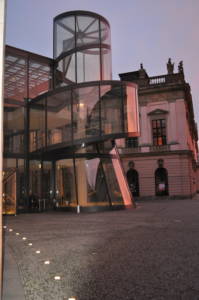
Lisbon, Portugal
NAYEREH DOOSTI interviews JEFF HOLMES

J.M. Holmes was born in Denver and raised in Rhode Island. His literary prizes include the Burnett Howe Prize for fiction at Amherst College, the Henfield Prize for literature, and a Pushcart Prize. His work has appeared in The Paris Review, The White Review, How Journal, the Missouri Review, and Gettysburg Review. His debut book How Are You Going to Save Yourself was published with Little, Brown and Sceptre books in August 2018.
Translated by AURORA LAUZARDO UGARTE
The hole is behind the headboard. We opened it some time ago. I couldn’t say exactly when we became aware of the weariness lurking around us, maybe eight years ago. It lasted for hours, sometimes for days. Then it disappeared. During those anxious periods, we didn’t know what to do. It’s a horrible feeling. You can’t stand being with that person any longer. It’s not boredom in the strict sense of the word. Intolerance, perhaps. Everything annoys you. The way they click their tongue, the unexpected smile, the wrong word said at the wrong time, the obsequious caress. Even the things that you thought were funny before seem unbearable now. It may be the cumulative effect, a friend said. A sort of allergy—you stuff yourself on your favorite food until one day your body says: Enough! You break out in red spots, itching and sweating, which only makes it worse. Just like that. Too much of a good thing, I say. One day we looked at each other and we couldn’t take it anymore—I was fed up with him, and he with me—and we searched for a solution.
Translated by RICARDO ALBERTO MALDONADO
“Hunger. It’s like an animal trapped inside you, Thomas thought.” —James Dashner
The flavor of those eyes continued to dance in her mouth as she savored the aftertaste with little smacks of her tongue. Just before dawn, she lifted up her gaze toward the infinite, making out only the light that was deep blue and amber. Everything is relative to day, to night, to colors, and to sustenance. When you are hungry, your steps assume an ashen color as if in a dream of incineration—somber, grayish, full of pain. We’ve all been hungry, we are hunger, yet she was alone. Especially after that early morning when nature exploded into wind and rain, leaving her home battered. That morning, three of her kittens, her only companions, drowned in her basement.
Translated by HANNAH COOK
Bimbo has gone to the beach alone three times.
The first time was when he bought the used car which he would drive for the next decade, at nineteen. As soon as he arrived at his house after having finalized the transaction and showed it to his family, and as soon as his grandmother had gone back to her telenovela after congratulating him, and his brother back to the phone, stuck talking to his girlfriend, Bimbo went into his room, put a bathing suit on under his jeans, threw two towels into his backpack, got into the car, and descended, alone, from the mountains of Caguas, where three generations of his family still lived. He went alone in his new-but-old Toyota Corolla without air conditioning and with the windows down and the radio tuned to the only English music station that reached them up there. He felt nervous. It was 11 a.m. on a Wednesday.
Translated by MARÍA JOSÉ GIMÉNEZ
June 10, 2018
New York City
This year, the Puerto Rican flag wore black. Only the white star remained. Seeing it dressed in mourning, it was impossible not to feel a knot from your chest to your gut.
Book by PAULA SAUNDERS
Reviewed by TESS CALLAHAN
Willa Cather once said, “Most of the basic material a writer works with is acquired before the age of fifteen.” I thought of those words while reading Paula Saunders’s cinematic debut novel, The Distance Home, which she has said is based on her fractured 1960s South Dakota childhood. Saunders draws from a deep well.
The Distance Home joins such recent novels as Adam Haslett’s Imagine Me Gone, Joyce Carol Oates’ A Book of American Martyrs, Ann Patchett’s Commonwealth and Elizabeth Strout’s My Name is Lucy Barton that explore family dysfunction. Saunders asks us to consider the violent underside of American drivenness and its impact on a family’s most vulnerable members.
By SUSAN HARLAN

Great Smoky Mountains National Park
The Little River isn’t very little or rather
I don’t know what it is little in relationship to.
By the bank the water is smooth as paper
but in the middle my sneakered feet are unsteady
pulled by the current.
With ANJUM HASAN

Your name: Anjum Hasan
Current city or town: Bangalore
How long have you lived here: Twenty years
Three words to describe the climate: Mostly quite pleasant
Best time of year to visit? October to March
By SEAN GILL

Berlin, Germany
Inside Berlin’s Deutsches Historisches Museum, there is a quiet passageway which serves as a spatial juncture between the Nazi era and the Soviet one. There is only one exhibit in this place: an enormous metal globe, encircled by wooden framing and encased in glass. Its lands are tinted municipal yellow-brown, its seas faded cyan. This particular globe may once have belonged to Ribbentrop, Goebbels, or perhaps Hitler himself. This is not a shock; Hitler’s actual desk rests in the preceding room, about forty meters behind you. You have therefore already experienced such a flood of icy association; an anxious dread similar to when you behold a steep precipice, or pass by a policeman toting an automatic weapon.